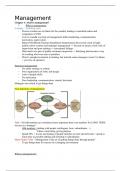Management
Chapter 1: what is management?
I. What is management
Example – Sellafield plant
- Process workers are to blame for the scandal, leading to cancelled orders and
resignation of CEO
- Core of scandal was lack of management skills (leadership, communication,
motivation, supervision)
- Report NII (British Nuclear Installations Inspectorate) discovered a lack of high-
quality safety systems and improper management -> focused on nature of job, lack of
supervision and poor training => procedural failings
- Data check was part of quality assurance inspection -> falsifying data became a way
of avoiding what was seen as pointless
- Wasn’t enough investment in training, but insisted senior managers weren’t to blame
+ you rely on operators
Improper management
- No safety strategy or culture
- Poor organization of work/ job design
- Lack of people skills
- No motivation
- Poor leadership, communication, control, decisions
Managers are critical to get things done
Four functions of management
Daft: “All odd numbers are considered more important than even numbers for LONG TERM
success as a manager”
Odd numbers= dealing with people (colleagues, boss, subordinates…)
Values, motivating, giving purpose
- Spend 50% + in care and feeling of people (lunches to meet and network) + spend as
much time as possible talking and listening to subordinates
Mary Parker Follet: “Management is the art of getting things done through people”
- To get things done for success in a changing environment
What is management?
,To get things done
- Achievement of organizational goals in effective and efficient manner (planning,
organizing, leading, controlling organizational resoucres)
Managers want success
- Coordinating and overseeing work activities of others -> that their activities are
efficiently and effectively
Managers work in changing environment
- Process of working with and through others to achieve organizational goals in a
changing environment
Efficiently and effectively?
Efficiency= doing things right, getting most output for least inputs
Effectiveness= doing the right things, attaining organizational goals
- Quinn & Rohrbaugh: competing value approach
- is it productivity, capital growth, happiness of employees?
- Effectiveness is a ‘fuzzy’ concept
- Interviewed ‘experts’
- Similarity judgement
- Multidimensional scaling (Indscal)
Quinn Rohrbaugh completing value framework – 4 indicators of effective organizations from
2 conceptions
(1) Y-axis: structure (flexibility, control)
(2) X-axis: focus (internal, external)
Values ->
culture
CLAN CULTURE: ADHOCRACY:
Extended family – mentoring, nurturing, Dynamic, entrepreneurial, people, take risks,
coaching innovation
HIERARCHY: MARKET ORIENTED CULTURE: Competitive
Culture of structure and control, coordination, organizations – Results oriented, getting the job
formalization, efficienty done, Internal competition, achievement
Means -> structure
Simple organization Adhocracy/network organization
Machine organization Diversified/division organization
Critiques
- Methodological issues
- Other research; adhocracies are less innovative than market cultures
, - Quadrants are not paradoxes, they complete each other
II. What do managers do?
- Managers continuously take decisions concerning planning, organizing, leading and
controlling
- What they do mostly depends on their level
Management levels
- Top managers (CEO): P -> O -> C
- Middle managers (department managers): O -> C -> L
- First-line managers (functional head): L -> C -> O
- Non-managers
Management roles
- Informational roles
- Monitor: seek & receive information
- Disseminator: forward information to others
- Spokesperson: transmit information to outsiders
- Interpersonal roles
- Dealing with people, relations
- Figure head: perform ceremonial duties
- Leader: direct and motivate subordinates
- Liaison: maintain information links
- Decisional roles
- Entrepreneur
- Disturbance handler: take corrective actions
- Negotiator: represent departments during negotiations
- Resource allocator: decide who gets resources
Management skills – emotional intelligence
Self-awareness= ability to read one’s emotions + recognize their impact
Self-management= controlling one’s emotions + impulses and adapting to changing
circumstances
Social awareness and empathy= ability to sense, understand and react to others’ emotions
while comprehending social networks
Relationship management= ability to inspire, influence and develop others while managing
conflict
III. Does management matter?
Management scores were compared with performance data -> significant correlations were
found between management score:
Return On Capital Employment (ROCE)
Total Factor Productivity (TFP)
Higher sales per employee
, Higher stock market valuations
What explains differences in the average management scores?
- Country: 2% for its average management score
- Industry and sector: 42%
- 56% to be determined entirely by what managers choose to do
Yes, management matters!!
Fun to be a manager?
Stressors: increased workload, challenge of supervising former peers, responsibility, balance
+: leading, networking, innovating
-: controlling, desk work, working under time pressure
IV. What is an organization?
Organization= deliberate arrangement of people assembled to accomplish some specific
purpose that individuals independently couldn’t accomplish alone
- Direct purpose (goal)
- Composed of people
- Deliberate structure
V. Management of small businesses and non-profit organizations
Small business: less hierarchy, less specialization, less resources for things outside the core
Non-profit: less tangible added value, accountability, different culture and values
VI. Why to study management?




